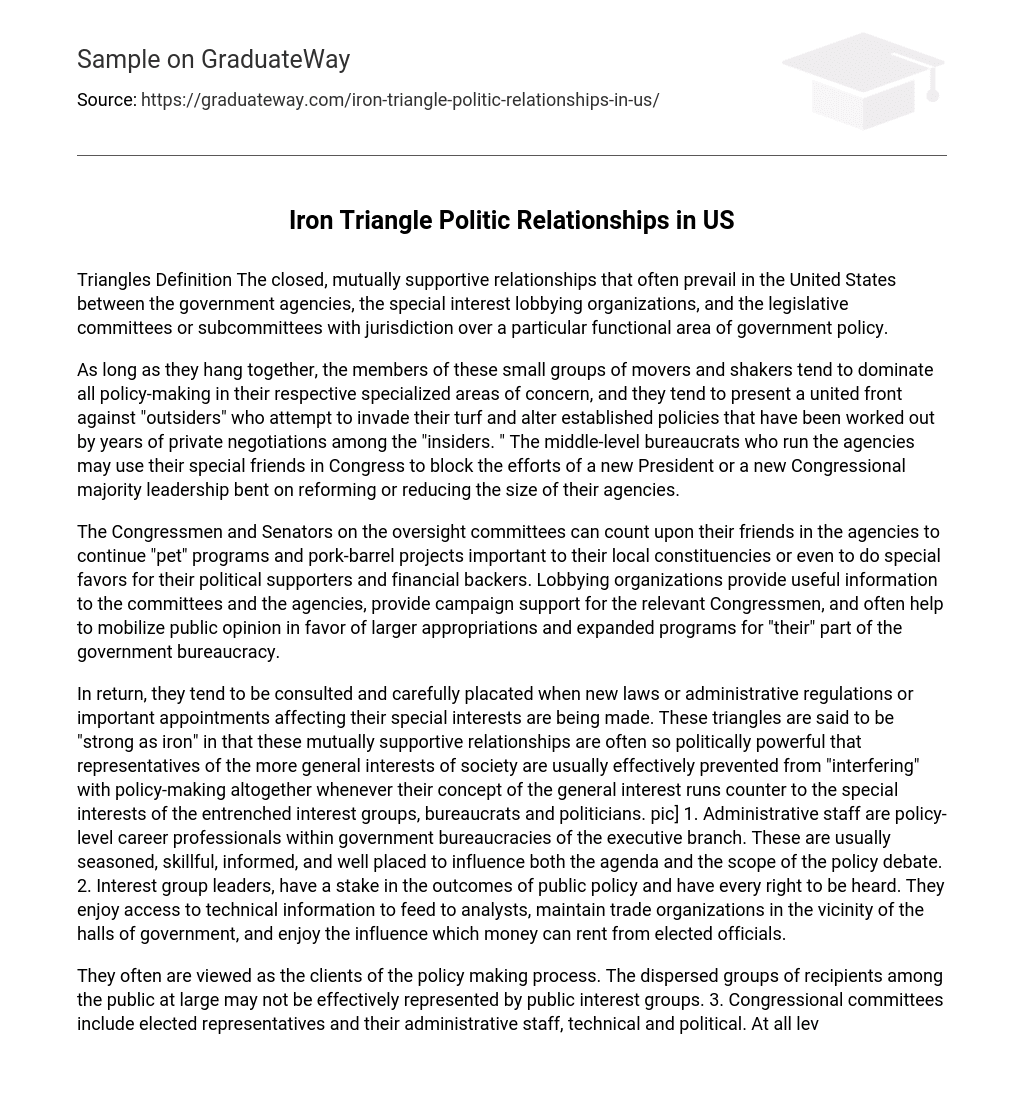Triangles Definition The closed, mutually supportive relationships that often prevail in the United States between the government agencies, the special interest lobbying organizations, and the legislative committees or subcommittees with jurisdiction over a particular functional area of government policy.
As long as they hang together, the members of these small groups of movers and shakers tend to dominate all policy-making in their respective specialized areas of concern, and they tend to present a united front against “outsiders” who attempt to invade their turf and alter established policies that have been worked out by years of private negotiations among the “insiders. ” The middle-level bureaucrats who run the agencies may use their special friends in Congress to block the efforts of a new President or a new Congressional majority leadership bent on reforming or reducing the size of their agencies.
The Congressmen and Senators on the oversight committees can count upon their friends in the agencies to continue “pet” programs and pork-barrel projects important to their local constituencies or even to do special favors for their political supporters and financial backers. Lobbying organizations provide useful information to the committees and the agencies, provide campaign support for the relevant Congressmen, and often help to mobilize public opinion in favor of larger appropriations and expanded programs for “their” part of the government bureaucracy.
In return, they tend to be consulted and carefully placated when new laws or administrative regulations or important appointments affecting their special interests are being made. These triangles are said to be “strong as iron” in that these mutually supportive relationships are often so politically powerful that representatives of the more general interests of society are usually effectively prevented from “interfering” with policy-making altogether whenever their concept of the general interest runs counter to the special interests of the entrenched interest groups, bureaucrats and politicians. pic] 1. Administrative staff are policy-level career professionals within government bureaucracies of the executive branch. These are usually seasoned, skillful, informed, and well placed to influence both the agenda and the scope of the policy debate. 2. Interest group leaders, have a stake in the outcomes of public policy and have every right to be heard. They enjoy access to technical information to feed to analysts, maintain trade organizations in the vicinity of the halls of government, and enjoy the influence which money can rent from elected officials.
They often are viewed as the clients of the policy making process. The dispersed groups of recipients among the public at large may not be effectively represented by public interest groups. 3. Congressional committees include elected representatives and their administrative staff, technical and political. At all levels of government, the size, role, and expertise of staff have grown significantly in the last twenty years. The staff often assumes a key advisory role.
Some members of Congress become experts in the scope of their committees, such as retired Senator Sam Nunn (D. Ga. ), who is highly regarded as an expert on defense strategy. An iron triangle is a political community among 3 very powerful players in the political process. This community can have very extensive collective power if all 3 sides of the triangle want the same thing: • They can be said to have an iron grip on public policy • They become a policy-making community Case Study: The Highway Beautification Act: – one of the aims was to remove billboards from all federal roads • Members of the relevant Congressional Committee, Federal Highway Administration officials and Business lobbyists (for advertisers and businesses who used such advertising space) carefully worked together and changed the bill to present the public with 2 choices: ~ Leave the 9000 billboards where they were OR ~ Spend $18 million on removing them (Use of false dilemma—we can only do the right thing by charging you big bucks! ) In effect they changed the Highway Beautification Act into a billboard protection law





